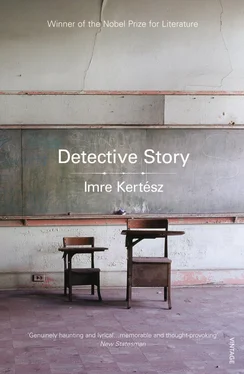Enrique also produces an envelope from his case.
As the papers are being tidied up, that envelope is slipped among the stranger’s documents.
The chap pockets the envelope.
They finish their discussion and put the files away. They pay and leave, separately.
So much for the film. We found out that the chap was called Manuel Figueras, a sales clerk who had worked for a few years for the Salinas stores. A married man, he had two children. He had no lover, and his name didn’t turn up in our records. The Salinas company’s personnel department, where we had one of our people (why would we not have one there, of all places?), could tell us nothing about him of any interest.
Figueras hurried from the café straight back to his office. He went by bus, having left his beat-up Volkswagen in the big parking lot in front of the Salinas office building. He only popped up again once work was over: he got into his Volkswagen and drove straight home.
Over the ensuing days Figueras traveled only between his office and home. We tailed him on his journeys, but he didn’t have a telephone for us to tap. His partner was a housewife; she had no lover. Her time was entirely taken up with housework; we noticed nothing suspicious about her shopping trips. Their ten-year-old boy attended school; the four-year-old girl we discounted. On Saturday evening Figueras went with his wife to see a movie. On Sunday afternoon he took his son to watch a soccer match. Never even once did he make contact with strangers. What had he done with the envelope? Was it still on him, perhaps? Or had he passed it on? Might it have been addressed directly to him? We had no way of knowing.
Ten days later Enrique Salinas’s Alfa Romeo headed out of the city and turned onto the southwestern trunk road. He stopped in B., the region’s fashionable seaside resort. He checked into a room in a busy hotel, using his own name. That evening he went down to the bar. It was hot, and he was lightly dressed in slacks and a colorful, high-necked silk shirt. He was presumed not to have a briefcase — our men came across it when they searched his room during his absence. Among other things they found inside was an envelope containing a folded sheet of white paper. It bore the number “3” in the top left-hand corner and in the middle were six typewritten letters in the sequence ENAUSE. The envelope was resealed with an appropriate technique, and all traces of our search were removed.
The next morning Figueras’s beat-up Volkswagen headed out of the city and turned onto the southwestern trunk road. He stopped in B. and parked his car in front of Enrique Salinas’s hotel. He went into the hotel’s bar and ordered himself a drink.
At precisely eleven o’clock, Enrique Salinas came down from his room and looked into the bar. Undoubtedly, he noticed Figueras. He left without having taken a seat.
Figueras soon paid and returned to the parking lot. There he found Enrique Salinas, who was fussing with something under the hood of his Alfa Romeo. They greeted each other like old acquaintances. Figueras got into his own car, then for a minute Enrique Salinas — in the midst of speaking to him — climbed in beside him. On this occasion our man, from his adverse position, saw nothing, but he presumed that at this moment Enrique must have passed the envelope on to Figueras.
Afterward, Figueras promptly started up the engine and, on getting back to the city, did not stop until he reached the Salinas office building. He entered the building right away and did not leave it again that day until work was over. Then he again hurried directly to his parking space. He was extremely surprised to find, in the spot where he had presumed his Volkswagen would be, a black limousine. Twenty minutes later he found himself at Corps headquarters. We set about interrogating him without further ado.
I am unhappy talking about this, especially going into details. All the newspapers have printed enough bullshit about this sort of thing nowadays; everybody now knows how that sort of thing goes: roughly the way they can see in their idiotic movies, just a bit more to the point. And well, with the difference that everything is for real.
It’s nasty work, I can tell you, but it’s part of the job. We take away the offender’s mind, shred his nerves, paralyze his brain, rifle through every pocket and even his innards. We slam him into a chair, draw the curtains, light a lamp — in short, we go by the book. We didn’t make any effort to surprise the offender with some original twist. Everything happened in the way those ham-handed films would have prepared him for; everything happened the way he would expect; and precisely that was always the surprise — check it out if you don’t believe me. We gather around, with Diaz facing him, Rodriguez to the side, me behind.
Then out comes the line. And a flood of questions, simply deluging him.
“Right, pig,” one of us will kick off. “Playtime’s over. You’ve been rumbled.”
“We know everything,” another interjects. “You’ll only be hurting yourself if you try to deny anything.”
“Young Enrique’s already spilled the beans. You’d be well advised to do the same.”
“It’s in your interest. It’s all the same to us.”
“It’s difficult, we know, but if you’re a good boy, you can be let off. Bear that in mind.”
“What’s the point of getting your nuts crushed if your accomplice has already spilled the beans?”
“So be a good boy, open your mouth. Or are we going to have to open it for you?!”
“Who’s your go-between?”
“Where’s the envelope?” (A body search had not revealed it on him.)
“Where’s your weapons dump?”
“When are you planning for the atrocity to happen?”
“Which group do you belong to? Spit it out!”
“You’ve no choice anyway. Let yourself go, be sensible!”
“Be sensible, then you’ll soon be rid of us.”
“Your accomplices have hung you out to dry. Do you want to carry the can alone? In their place?”
“Not talking, then?”
This was all bluff, as you can see, to prepare the ground. We stun him with a deluge of questions. He has to feel that he is utterly alone, whereas there are a lot of us; that we are able to do with him what we want; and that we know everything, much more than he could suspect. But that we’ve got it all wrong, and he’s the only one who can set us straight, if he wishes to improve his circumstances. It’s a stale old number, but it usually works. If you know of a better one, say so.
We then slowly get around to what is actually of interest to us. What we wanted to know from Figueras, for instance, was the story behind the envelope. We found out as well, though don’t push me on how. Figueras couldn’t cut it; Rodriguez wasted his time working on him, because what he had to say he spat out right away, and after that we were unable to drag anything further out of him.
In such cases Diaz would fill out a request form and call for the duty guard. Everybody had their place with us, and if the Homeland’s security was under threat, we weren’t accountable to anyone.
The three of us were left to ourselves. It was a wretched moment, that goes without saying. Just look at what we had extracted from Figueras. Federigo Salinas had sent him out to collect the envelopes. Beforehand he had been called into the boss’s office, and was offered extra pay for his work. “It’s a matter of confidential stock market tip-offs,” Figueras claims Salinas told him. It was a delicate matter of the sort that comes up not infrequently in business life; that was why he was asking him, Figueras, and not one of his managers, who might be recognized by the network’s agents. And that was why he asked Figueras to stick to certain precautionary measures. Figueras did not get nosy: he was a small fry who was glad for the confidence that was being shown in him and for the unexpected income. According to his statement, he didn’t know that Enrique Salinas was the boss’s son. We could believe him: never once during the whole time that we had him under observation did Enrique Salinas turn up at the Salinas office building. The first time Figueras met him was on the basis of a verbal description; on subsequent occasions he recognized the face. Figueras would then hand on the envelopes to Federigo Salinas.
Читать дальше












